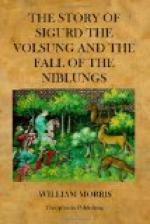Then the Goth-folk went to
slumber when the hall was washed from blood:
But a long while wakened Siggeir,
for fell and fierce was his mood,
And all the days of his kingship
seemed nothing worth as then
While fared the son of Volsung
as well as the worst of men,
While yet that son of Signy
lay untormented there:
Yea the past days of his kingship
seemed blossomless and bare
Since all their might had
failed him to quench the Volsung kin.
So when the first grey dawning
a new day did begin,
King Siggeir bade his bondsmen
to dight an earthen mound
Anigh to the house of the
Goth-kings amid the fruit-grown ground:
And that house of death was
twofold, for ’twas sundered by a stone
Into two woeful chambers:
alone and not alone
Those vanquished thralls of
battle therein should bide their hour,
That each might hear the tidings
of the other’s baleful bower,
Yet have no might to help
him. So now the twain they brought
And weary-dull was Sinfiotli,
with eyes that looked at nought.
But Sigmund fresh and clear-eyed
went to the deadly hall,
And the song arose within
him as he sat within its wall;
Nor aught durst Siggeir mock
him, as he had good will to do,
But went his ways when the
bondmen brought the roofing turfs thereto.
And that was at eve of the
day; and lo now, Signy the white
Wan-faced and eager-eyed stole
through the beginning of night
To the place where the builders
built, and the thralls with
lingering hands
Had roofed in the grave of
Sigmund and hidden the glory of lands,
But over the head of Sinfiotli
for a space were the rafters bare.
Gold then to the thralls she
gave, and promised them days full fair
If they held their peace for
ever of the deed that then she did:
And nothing they gainsayed
it; so she drew forth something hid,
In wrappings of wheat-straw
winded, and into Sinfiotli’s place
She cast it all down swiftly;
then she covereth up her face
And beneath the winter starlight
she wended swift away.
But her gift do the thralls
deem victual, and the thatch on the hall
they lay,
And depart, they too, to their
slumber, now dight was the dwelling
of death.
Then Sigmund hears Sinfiotli,
how he cries through the stone and saith:
“Best unto babe is mother,
well sayeth the elder’s saw;
Here hath Signy sent me swine’s-flesh
in windings of wheaten straw.”
And again he held him silent
of bitter words or of sweet;
And quoth Sigmund, “What
hath betided? is an adder in the meat?”
Then loud his fosterling laughed:
“Yea, a worm of bitter tooth,
The serpent of the Branstock,
the sword of thy days of youth!
I have felt the hilts aforetime;
I have felt how the letters run
On each side of the trench
of blood and the point of that glorious one.
O mother, O mother of kings!
we shall live and our days shall be sweet!
I have loved thee well aforetime,
I shall love thee more when we meet.”




